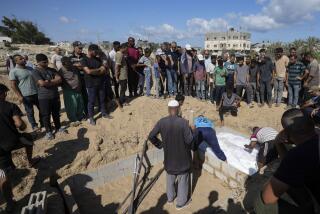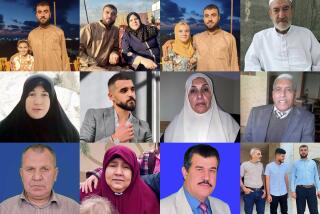In Baghdad, there’s no safe place to mourn a mother
- Share via
BAGHDAD — It has come to this in Iraq: A son cannot even lay his mother to rest.
I have a good friend called Jamal, and I think of him as a brother. His mother had been sick and she died last week. Like any son, he wanted to bury her himself. But when I called him the morning of the funeral Thursday, he said that most of the men in his family would not be going to the cemetery for fear of drawing the attention of police or sectarian militias.
I decided not to go either, because the road leads through Abu Ghraib, one of the most dangerous neighborhoods in Baghdad.
Once the funeral procession had left his house, Jamal drove by and picked me up so we could go to the market together. The custom in Iraq is to cook a big meal for the many visitors who come to pay their condolences.
We bought meat, beans, dried apricots, raisins, almonds, cardamom, spaghetti, eggs, coffee and cigarettes. We also picked up a live sheep to slaughter later.
When we put the animal in the trunk of the car, it struggled to get out. It reminded me of all the kidnapping victims who are stuffed in trunks and taken to an isolated part of Baghdad to be shot.
Driving back to Jamal’s house, we saw what looked like pieces of a Humvee lying in the road -- another bombing, we guessed.
Jamal also needed to rent plastic chairs for his visitors. There were a few shops nearby where you can do this, but they were in a Shiite Muslim area and he is Sunni. So he had to ask relatives who live in another part of the city to bring them.
We placed the chairs in the garden for the men. The women stayed inside. I wanted a friend of mine to come, but he hesitated, because Jamal lives in one of the so-called hot neighborhoods. I told him that the house faces the highway, so he wouldn’t have to drive through any dangerous streets. He came, but stayed only 15 minutes.
By noon, nine men were sitting in the garden. We did our midday prayers together and then went inside and sat at the kitchen table for lunch. Before we had finished eating, we heard a loud boom. Through the glass in the kitchen door, I could see fire and black smoke. Then we heard gunfire.
Most of the men rushed into the next room, where the women were sitting. I just hid behind the fridge.
One of the women burst into the kitchen screaming, “Where is Ziad? Where is Ziad? Was he outside?”
Someone shouted, “Here he is!” and pointed to a man holding a child.
The shooting subsided, but we were all worried that the house would be searched. We would have a hard time proving that all these men weren’t fighters.
After a bit, we peeked outside again and saw cars coming and going. That meant there were no troops blocking the road, so it seemed like a good time to slip away and look for a taxi home.
As I headed out, I saw a truck that probably belonged to the Iraqi security forces burning on the other side of the highway.
I waved at a couple of taxis, but none of them stopped, so I hopped on a bus. When the passengers saw the burning vehicle, they started asking in hushed voices what had happened.
“IED,” I said, using the American shorthand for an improvised explosive device.
As we got closer, we saw a burning body on the ground next to the truck.
Some of the people expressed pity at the sight. But one man said, “Well done.”
The driver disagreed, telling him that the officers are our fellow citizens, and the attack should have been directed against the Americans.
The man replied, “They are much worse than the American forces. I still say well done.”
When we got to the entrance of my neighborhood, we saw a vehicle window and a tire in the road. Everybody on the bus agreed that they belonged to a Humvee. Someone commented that they hadn’t been there in the morning.
When I got home, I called Jamal. He told me that the Iraqi forces had returned to his neighborhood and that there was lots of shooting. Two bullets had landed in the kitchen where we had been eating our meal of remembrance and mourning.
*
The writer of this account of daily life in Baghdad is an Iraqi reporter in The Times’ Baghdad Bureau. His name is not being used to protect his safety.
More to Read
Sign up for Essential California
The most important California stories and recommendations in your inbox every morning.
You may occasionally receive promotional content from the Los Angeles Times.













